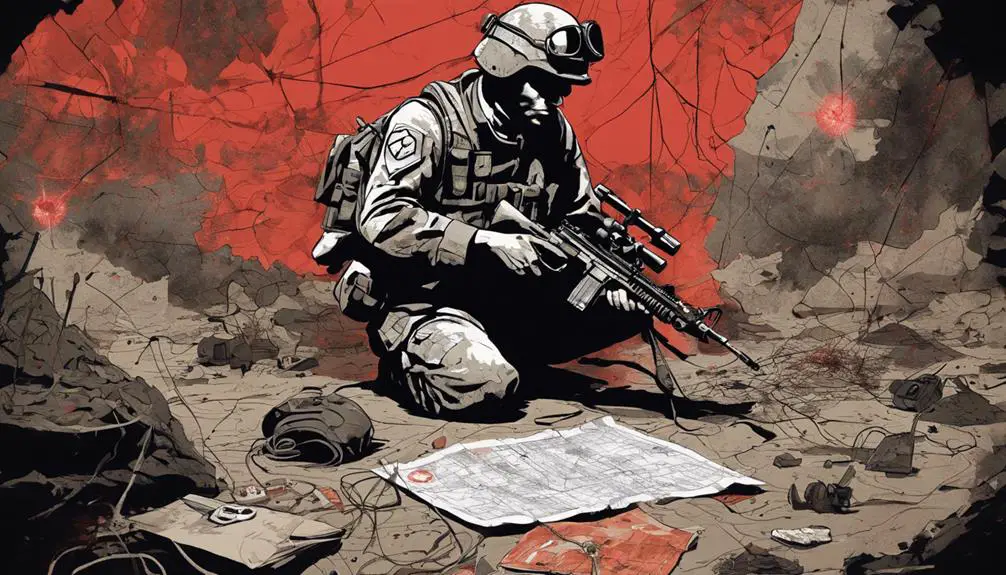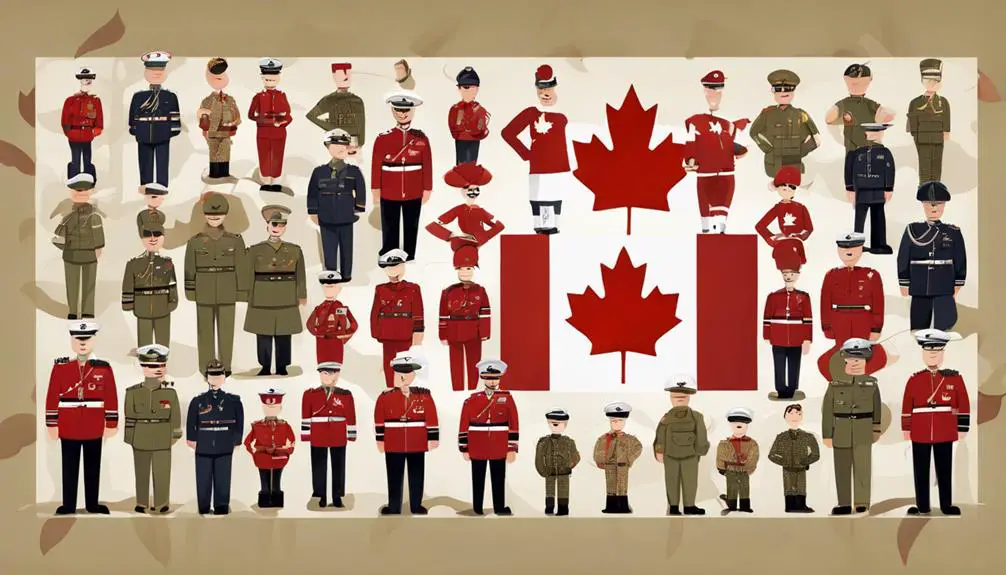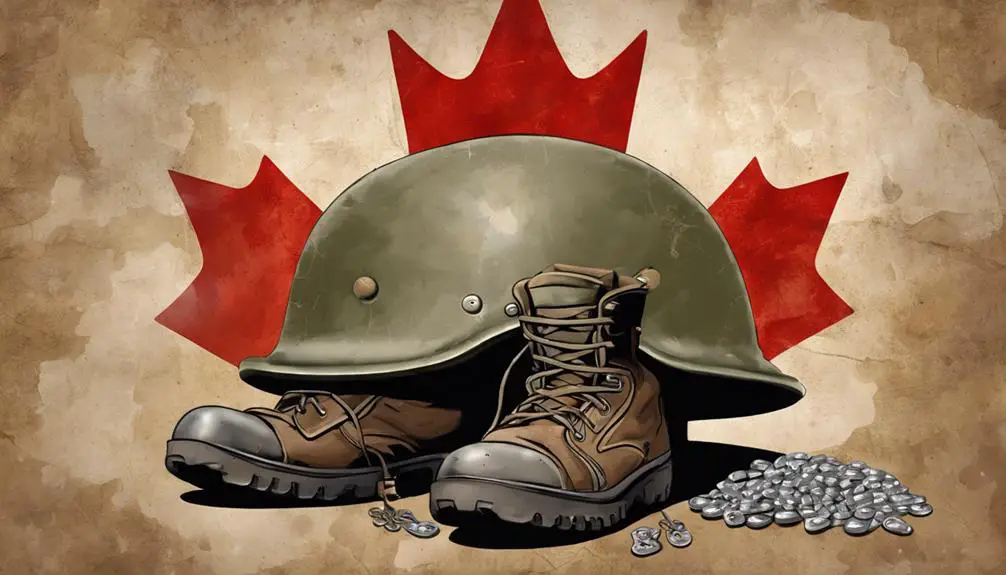You're about to enter a world of specialized lingo, where "ops" isn't just a coffee order. In the Canadian military, "ops" means operations, and "ex" means exercise. Your backpack is a "ruck," and your personal gear is your "kit." Nicknames for ranks and roles, like "The Old Man" for the Commanding Officer, reflect camaraderie. Acronyms and abbreviations, such as "Op" for Operation and "Coy" for Company, streamline communication. As you explore this unique language, you'll uncover its historical ties and cultural influences. Get ready to crack the code and uncover the nuances of Canadian military slang. There's more to discover beyond the surface level.
Slang for Military Operations

When deploying on a mission, you'll likely hear Canadian military personnel using slang to describe various military operations, such as 'ops' for operations or 'ex' for exercise. This specialized language helps facilitate communication and make sure everyone is on the same page.
For instance, when receiving Op orders, you'll understand that these are the detailed instructions outlining the mission's objectives, timelines, and expectations. You might also hear discussions about Sitreps, or situation reports, which provide real-time updates on the mission's progress. These concise reports help commanders make informed decisions and adjust their strategy as needed.
As you work alongside Canadian military personnel, you'll pick up on this unique vocabulary, which is essential for effective teamwork and success in the field. By understanding these slang terms, you'll better comprehend the nuances of military operations and enhance your collaboration with your Canadian counterparts.
Equipment and Gear Lingo
You'll quickly realize that Canadian military personnel use a distinct vocabulary to describe their equipment and gear, with terms like 'kit' for personal gear and 'ruck' for backpack. This terminology helps streamline communication and guarantees efficiency in high-pressure situations.
Here's a breakdown of some common equipment and gear lingo:
| Term | Meaning |
|---|---|
| Ruck | Backpack |
| Kit | Personal gear |
| Tac Radios | Tactical Radios |
| Combat Boots | Heavy-duty footwear for combat operations |
You'll also come across terms like 'webbing' for load-carrying vests and ' NVGs' for night vision goggles. Understanding these terms will help you better appreciate the complexity of military operations. When communicating with military personnel, using the correct terminology can make a significant difference in conveying your message effectively. By adopting this vocabulary, you'll be better equipped to understand the intricacies of military equipment and gear.
Ranks and Roles Nicknames

As you interact with Canadian military personnel, you'll notice they use informal nicknames to refer to ranks and roles, which can be just as important to understand as equipment terminology. These nicknames often reflect the camaraderie and humor that exists within the military community.
Here are some examples of Officer Monikers and Rank Humor:
- The Old Man: a respectful nickname for a Commanding Officer or Senior Officer
- The RSM: short for Regimental Sergeant Major, often referred to as the 'right-hand man' of the Commanding Officer
- The Gunner: a nickname for an artillery officer
- The Sarge: short for Sergeant, often used to address a Non-Commissioned Officer (NCO)
- The O: short for Officer, often used in a joking manner to refer to a junior officer
These informal nicknames are an integral part of military culture and are often used to break the ice or add some humor to an otherwise serious situation.
As you interact with Canadian military personnel, understanding these nicknames can help you build stronger relationships and better communicate with them.
Acronyms and Abbreviations
In the Canadian military, acronyms and abbreviations are an essential part of daily communication, saving time and increasing efficiency in high-pressure situations. You'll quickly realize that military jargon is filled with abbreviations, making it important to understand them to stay on the same page as your comrades.
For instance, you might hear 'Op' instead of 'Operation' or 'Coy' instead of 'Company'. These shorthand terms enable quick and clear communication, vital in fast-paced military environments.
Code names are another critical aspect of military communication. You might come across abbreviations like 'CDS' (Chief of the Defence Staff) or 'NDHQ' (National Defence Headquarters). Familiarizing yourself with these acronyms and abbreviations will help you navigate military communication like a pro.
Canadian Military Slang Origins

As you explore the world of Canadian military slang, it's crucial to understand its origins. Military slang terms in the Canadian military have their roots in a mix of British, American, and French influences, reflecting the country's historical ties and cultural exchange. This unique blend of influences has shaped the language and culture of the Canadian military.
The evolution of Canadian military slang is a proof of the country's cultural evolution. Here are some key factors that have contributed to its development:
- Historical ties to Britain: Canada's historical ties to Britain have introduced British military slang into the Canadian military lexicon.
- American influence: Proximity to the United States and joint military operations have led to the adoption of American military slang.
- French influence: Canada's bilingual heritage has incorporated French military terminology into everyday military language.
- Cultural exchange: The exchange of ideas and language between different cultures has enriched the Canadian military's linguistic landscape.
- Influence of modern technology: The rapid advancement of technology has introduced new terminology and slang into the military vocabulary.
Understanding the origins of Canadian military slang provides a deeper appreciation for the complex cultural and historical context in which it has evolved.
Everyday Slang for Troops
You'll often hear Canadian military personnel throwing around everyday slang terms that are an integral part of their daily communication. These colloquialisms are used to convey a sense of camaraderie and shared experience among troops.
In the barracks, you'll hear 'Barrack Banter' – lighthearted teasing and joking that helps to relieve stress and build unit cohesion.
In the Mess Hall, 'Mess Hall Lingo' is used to order food and drinks, with terms like 'mug-up' for coffee and 'scran' for food. These everyday slang terms are essential to the Canadian military's unique culture and are used to facilitate communication, build relationships, and create a sense of belonging.
They're an important part of military life, and understanding them is vital for effective teamwork and collaboration. By using these slang terms, troops can quickly convey complex ideas and emotions, and they add flavor to the military's distinct dialect.
Frequently Asked Questions
Do Military Slang Terms Vary Across Different Branches of the Canadian Military?
You're wondering if military slang terms vary across different branches of the Canadian military. The answer is yes, they do.
Branch differences play a significant role in shaping unique slang. For instance, the Naval nuances of the Royal Canadian Navy have distinct phrases that mightn't be understood by the Army or Air Force.
Each branch develops its own lingo, influenced by its specific culture and operations.
Can Civilians Use Canadian Military Slang in Everyday Conversations?
When you use slang from any subculture, including the military, in everyday conversations, you're borrowing from a specific group's language. This raises questions about cultural appropriation.
However, language is meant to evolve, and linguistic evolution often involves borrowing and adapting terms. If you're respectful of the origins and context, using military slang can add flavor to your conversations.
Just be mindful of the cultural significance and avoid misappropriation.
Are Canadian Military Slang Terms Used Universally Across All Ranks?
You might assume that slang terms are used universally across all ranks, but that's not entirely true.
In a formal hierarchy like the military, the rank structure plays a significant role in communication. While some slang terms are widely used, others are specific to certain units or ranks.
As you move up the ranks, the language adapts to the level of formality and professionalism required. So, while some slang terms are universal, others are reserved for specific groups or contexts.
Do Military Slang Terms Change Over Time, or Remain Static?
You might wonder if slang terms remain static over time. Investigating this theory, you'll find that language is constantly evolving.
In reality, slang terms undergo an evolution analysis, where they adapt to cultural and social changes. This phenomenon, known as language drift, causes slang to shift in meaning or fall out of use.
As a result, military slang terms are unlikely to remain static, but rather change over time to reflect the dynamic nature of language and culture.
Are Canadian Military Slang Terms Used in International Military Operations?
When you're part of international military operations, language barriers can lead to Coalition Confusion. You've likely experienced Multinational Miscommunication, where terms don't translate seamlessly.
Now, add Canadian military slang terms to the mix. You might wonder if they're used in these ops. The answer is yes, but with caution. Canadian troops adapt to standardized NATO terminology to avoid confusion, while still using some slang terms within their units, ensuring clarity without compromising camaraderie.
Conclusion
As you wrap up your journey through Canadian military slang, remember that these terms are more than just tongue-twisting titbits – they're a reflection of the troops' tenacious team spirit.
From 'FNG' to 'Gucci', each phrase is a fascinating fragment of a fascinating culture.
By grasping these gritty, guttural terms, you've gained a glimpse into the gritty, gutsy world of the Canadian military.







